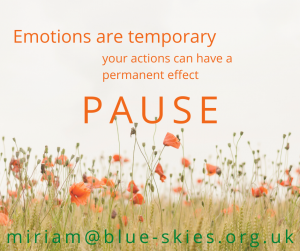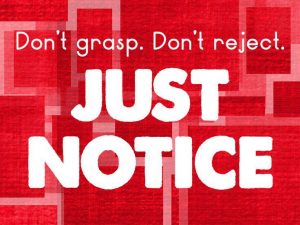Pause Gently: Hold Lightly
Do you have your dreams, or do your dreams have you? Do you have your feelings or do your feelings have you? Do you have your job or does your job have you? Hold it lightly, then you can put it down when you have had enough.
Miriam Grace
I’m aware that sometimes we have anger and sometimes anger has us, sometimes we have guilt and sometimes guilt has us. What is the difference between a feeling having us and us having a feeling? I think it can be seen in our behaviour. When we choose our behaviour we have a feeling that now informs our behaviour. When a feeling has us, we may say, ‘I don’t know why I did that’, or ‘I wasn’t thinking’ or ‘it just happened’. When the instinctive, knee jerk reaction happens sometimes it can be helpful – you might save someone from stepping into moving traffic – or unhelpful (you may yell unkindly at someone).
What can we do about this quick reactions? They can seem to happen before we know it.
We can S L O W D O W N We can respond from reason rather than threat. Let’s see how.
Fight flight reactions are very fast and they don’t get processed by our more sophisticated brain.
 If we start our day with plenty of time, we can approach things with gentleness, we produce less adrenaline, we are in a calmer state of mind. Meditation, journalling, quiet reflection, yoga, walking, prayer are all ways that people turn down the volume on fight flight reactions.
If we start our day with plenty of time, we can approach things with gentleness, we produce less adrenaline, we are in a calmer state of mind. Meditation, journalling, quiet reflection, yoga, walking, prayer are all ways that people turn down the volume on fight flight reactions.
Choice is similar the the psychosynthesis concept of WILL and reminds me of the Alexander Technique concept of ‘direction’, the idea of directing ourselves through choice rather than reacting with habit. This concept is usually applied physically, but in my work alongside Imogen Ragone and we show how this can also be applied psychologically.
The ultimate technique for choosing and directing as opposed to reacting, is the PAUSE.
Changing how we start the day and beginning to learn to pause during the day is a tiny change that can make a big difference.
In Gestalt we practice awareness. Awareness is the goal and the methodology of Gestalt. Change is not the goal, noticing, awareness is. From noticing and awareness we then have choice and we may change. Thus pausing in itself is the change and changes in consequence are a bi-product!
“Until you make the unconscious conscious it will direct your life and you will call it fate.”
Carl Jung.
When someone hurts us, it’s so easy to react and respond. If we pause we may learn. “Until you make the unconscious conscious it will direct your life and you will call it fate.” Carl Jung. How can you take action to direct your life? Do nothing, stop, pause, connect, be fully aware.
Learning the pause is not always easy. Sometimes it is very hard to let go of that reaction or of our identity held within a response (for example if we strongly identify ourselves as a helpful person it may be difficult to pause and choose whether ‘no’ might be a better answer, when someone asks for help). Sometimes we just react anyway!
“Change is not the goal. Noticing, awareness is.” Miriam Grace
This is when our identities and our feelings have us rather than us having them. Then we might say, “I couldn’t help myself”, “it just came out”. I don’t want to live a life where I have no choice and so I feel I must apply myself diligently to the pause in order to be choice-ful rather than a victim of the tides of emotions and habits.
 DO THIS NOW: Just pause, and breathe, and notice.
DO THIS NOW: Just pause, and breathe, and notice.
DO THIS TODAY: At any given moment (and most usefully at busy moments), just pause, and breathe and notice. Instead of filling a pause in conversation, or adding your piece, instead of picking up the phone or the biscuit tin, just pause for a few seconds so that your action contains choice. Our participants on the workshop went away with the pause button logo in their pack so that if they wish they can put a reminder around their house or at work while practicing the pause.
Gestalt therapy is a practice that keeps bringing the client back to their awareness of self, moment to moment, often asking where something is experienced in the body. Alexander Technique is similar in its noticing of the body. Imogen explained that if we think we must relax then we are “doing” and trying again, if we plant the thought in our mind that we are at ease and have plenty of time, our body relaxes without us trying.
I would like to write more about the idea of thoughts planted in our head and how they impact on our bodies soon, and I’d love to spend time telling you about our fabulous workshop and all the insightful exercises we did. However, I’m going to pause here and write more on that next time.
![]()

Comments
Pause Gently: Hold Lightly — No Comments
HTML tags allowed in your comment: <a href="" title=""> <abbr title=""> <acronym title=""> <b> <blockquote cite=""> <cite> <code> <del datetime=""> <em> <i> <q cite=""> <s> <strike> <strong>